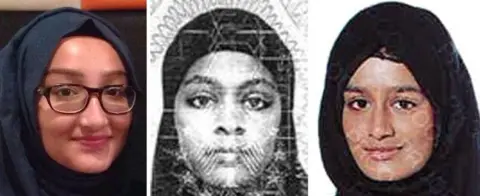Shamima Begum will not be allowed here, Bangladesh says
Shamima Begum is not a Bangladeshi citizen and there is "no question" of her being allowed into the country, Bangladesh's ministry of foreign affairs has said.
The UK has stripped the 19-year-old - who fled London to join the Islamic State group - of British citizenship.
Such a move is only possible if an individual is eligible for citizenship elsewhere.
It was thought Ms Begum had Bangladeshi citizenship through her mother.
But the ministry of foreign affairs said the government was "deeply concerned" she had been "erroneously identified" as a Bangladeshi national.
In a statement, it said Ms Begum had never applied for dual nationality with Bangladesh and had never visited the country.
It added that the country had a "zero tolerance" approach to terrorism and violent extremism.
Ms Begum was a schoolgirl when she left Bethnal Green in 2015, and was found in a Syrian refugee camp last week after reportedly leaving Baghuz - IS's last stronghold.
She gave birth to a son at the weekend and now wants to return home.
Ms Begum's mother is believed to be a Bangladeshi national, and lawyers have told the BBC that under Bangladesh law this means Ms Begum is automatically a citizen of the country as well.
But Ms Begum told the BBC's Middle East correspondent Quentin Sommerville that she only had "one citizenship" and it was wrong for the UK to revoke it without speaking to her first.
"I wasn't born in Bangladesh, I've never seen Bangladesh and I don't even speak Bengali properly, so how can they claim I have Bangladeshi citizenship," she said.
'Extreme circumstances'
While he said he would not comment on individual cases, Home Secretary Sajid Javid has suggested Ms Begum's baby could still be British.
He told the Commons: "Children should not suffer. So, if a parent does lose their British citizenship, it does not affect the rights of their child."
Mr Javid said the power to deprive a person of citizenship was only used "in extreme circumstances", for example, "when someone turns their back on the fundamental values and supports terror".
Asked about the situation on ITV's Peston, the home secretary said he would not leave an individual "stateless".
He said: "I'm not going to talk about an individual, but I can be clear on the point that I would not take a decision - and I believe none of my predecessors ever have taken a decision - that at the point the decision is taken would leave that individual stateless."
But shadow home secretary Diane Abbott accused him of breaching the Universal Declaration of Human Rights, which states that "no-one shall be arbitrarily deprived of their nationality".
 Met Police
Met PoliceMs Begum told the BBC: "I was hoping Britain would understand I made a mistake, a very big mistake, because I was young and naive."
She said she changed her mind about IS after they imprisoned and tortured her Dutch husband - an armed jihadi.
Escape was impossible, she claimed: "They'd kill you if you tried."
The lawyer for Ms Begum's family, Tasnime Akunjee, said they were considering "all legal avenues" to contest the Home Office decision and that she had effectively been made stateless.
Earlier, Ms Begum told ITV News that she found the Home Office's decision "heartbreaking", but she may try for Dutch citizenship via her husband.
He is a Dutch convert to Islam and is thought to have surrendered to a group of Syrian fighters about two weeks ago.
Islamic State has lost most of the territory it once controlled, but an estimated 300 militants are believed to be left in a tiny pocket of land near Syria's border with Iraq.
'Complex issue'
Under the 1981 British Nationality Act, a person can be deprived of their citizenship if the home secretary is satisfied it would be "conducive to the public good" and they would not become stateless as a result.
Ms Begum has the right to challenge the Home Office's decision either by tribunal or judicial review, said former independent reviewer of terrorism legislation Lord Carlile, but would have to prove the home secretary had acted disproportionately.
He said it was a "complex issue" which "could run for a very long time through the courts", and Ms Begum could stay where she is "for maybe two years at least".
Lord Carlile said her baby may be entitled to British, Dutch and Bangladeshi nationality.

Is Shamima Begum entitled to Bangladeshi citizenship?
By Clive Coleman, BBC legal correspondent
Lawyers have told the BBC that under Bangladesh law, a UK national born to a Bangladeshi parent is automatically a Bangladeshi citizen - a dual national - but the Bangladeshi authorities assert that's not the case for Ms Begum.
Under this "blood line" law, Bangladeshi nationality and citizenship lapse when a person reaches the age of 21, unless they make active efforts to retain it.
So, it is Ms Begum's age, 19, that is likely - in part - to have given Home Office lawyers and the home secretary reassurance there was a legal basis for stripping her of her UK citizenship.
In 2017, the government lost an appeal case brought by two British citizens of Bangladeshi origin who were stripped of their citizenship when they were abroad.
The Special Immigration Appeals Commission ruled that E3 and N3 had not tried to retain their citizenship before they reached the age of 21, and so it had automatically lapsed.
That meant that the decision to strip them of their UK citizenship had rendered them stateless.
Ms Begum's case is different. Her Bangladeshi citizenship, if established, would remain intact until she reaches 21, even if she has never visited the country or made active efforts to retain her citizenship.

